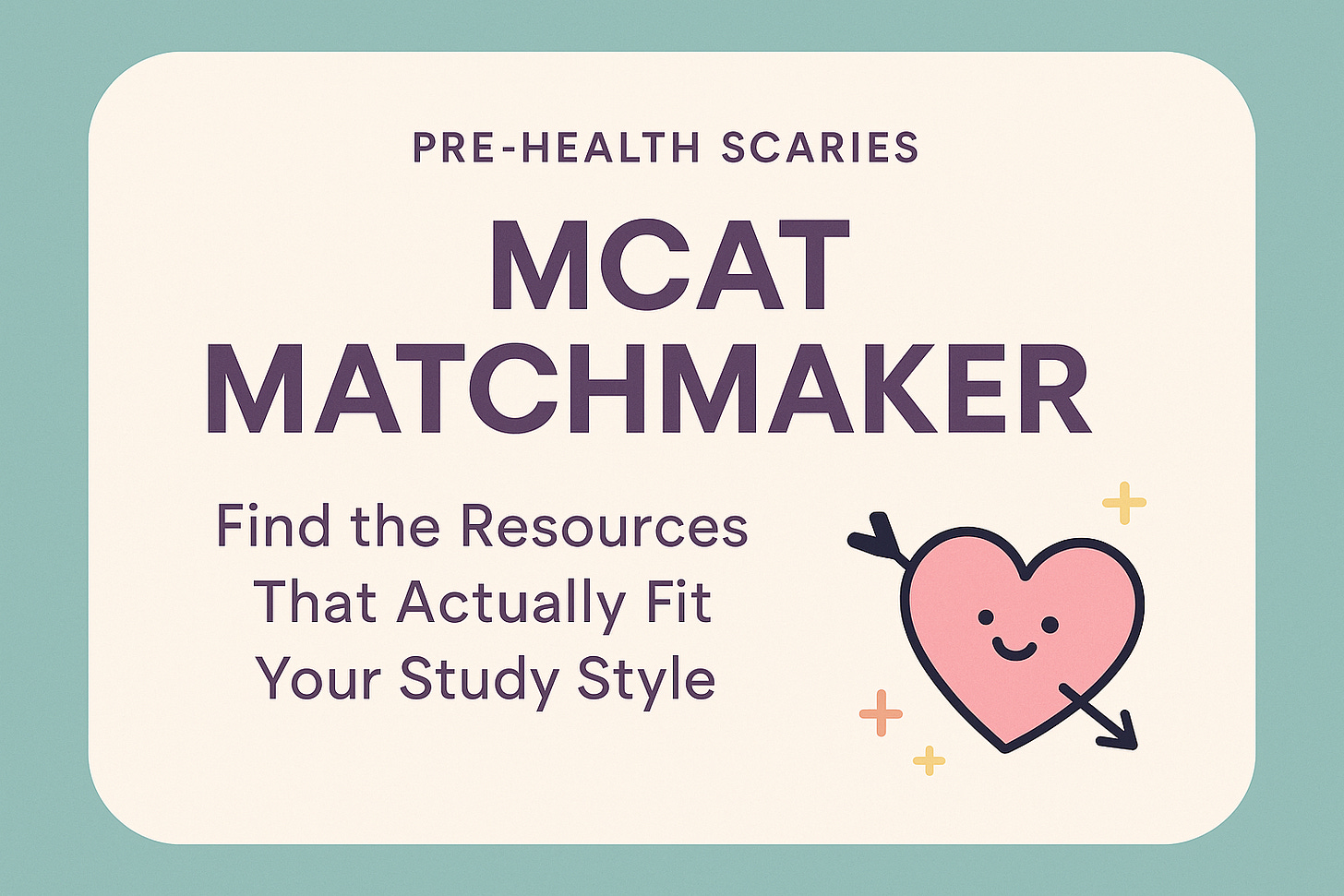MCAT Matchmaker: Find the Resources That Actually Fit Your Study Style
Drowning in MCAT Prep Options? Here’s How to Find What Actually Works from a 510+ scorer
The MCAT Resource Overload Is Real
The MCAT is hard. The MCAT is important…. hahaha do you get instant anxiety from the spam ads you see on YT? 😂
Ever feel like there are more MCAT resources than molecules in a chemistry passage? When I was studying for the MCAT, I remember watching YouTube videos, scrolling through Reddit and TikTok, and asking any upperclassmen I knew for their recommendations. I wanted to avoid purchasing resources that wouldn’t work, but also get the ones that would be the most beneficial.
Before you start studying for the MCAT, it often seems daunting. Everyone says you need at least 3 months and up to 6+ months to study for it. I wondered how much I could possibly need to learn or practice. What I quickly learned was that the time was necessary because it takes that long to begin gaining pattern recognition and adequately practice answering MCAT-style questions, which is more like a skill than a conceptual understanding. Like any sport or activity, practice is done incrementally over a long time. And the MCAT, unlike your university tests, is no different.
Today, in this pre-health scaries Monday post, I will help you choose MCAT resources tailored to how you learn, not just what’s popular.
Know Thyself: Identifying Your Study Habits and Preferences
Before you throw down hundreds on a prep course, ask yourself…
Do you learn best by reading, watching, doing, or discussing?
Are you a solo studier or do you thrive in group settings?
Do you need a rigid schedule or flexible, self-paced materials?
What’s your current content base? First-time learner or needing a review?
How much time do you have until your test date?
Resource Matchmaking: Best Tools Based on Learning Styles
Visual Learners:
Khan Academy videos (free and content-aligned)
Blueprint videos and Sketchy for science-heavy concepts
Towards the end of my studying, orgo and gen chem sketchy videos I found for free on YouTube, surprisingly, helped with memorizing all those pesky details
Auditory Learners:
Podcasts (e.g., MCAT Bros, The MCAT Podcast)
UWorld with explanation audio (if available)
YouTube videos are useful if you want dual visual and auditory components, which is how I personally learn best
Reading/Writing Learners:
Kaplan/Princeton Review books (I got PDF versions on Etsy for $15)
AAMC materials + Anki (MilesDown Deck ofc)
Making summary sheets of what you read/watch
Kinesthetic Learners (Doers):
Practice-heavy resources like UWorld and AAMC Qbanks
Concept-mapping and active recall tools
Structure vs. Freedom: Prep Course vs. DIY
When to consider a course:
You need accountability
You want structured scheduling and coaching
You have funding or access to scholarships
Besides MCAT prep, you would appreciate relearning foundational STEM content before med school
When DIY might work:
You’re a self-starter with a plan
This includes that you know yourself so well that you can prevent falling into your bad habits, such as procrastination
You’ve already taken most prereqs
You’re balancing work or other time constraints
I did not use a prep course because I knew I wanted to focus more on practice questions and only limited content review (I finished all prereqs already). All the content review I did was mainly from YouTube. If you’re similar to me, but also want to get a little extra support, you could buy some tutoring hours toward the end of your study period without getting a whole prep course. MedLife Mastery offers competitive prices compared to other companies in the market.
Budgeting: Smart Spending for Score Gains
Low-cost essentials: Khan Academy, MilesDown Anki Deck (check reddit), Jack Westin CARS, AAMC bundle
Mid-range DIY: Books + UWorld
High-cost, high-support: Blueprint, Kaplan, Princeton Review
Pro tip: Buy used or digital books, share access with study buddies (where allowed)
Need help making a study schedule? Make a customized one for free here!
Trial & Error Is Normal
Normalize switching strategies after a few weeks if something doesn’t click
I had a meltdown over my “strategy” multiple times throughout the 4 months I studied LOL ← I can only laugh about it now, a year later…
Reminder: Just because a resource works for a Redditor doesn’t mean it’ll work for you.
Final Tips & Encouragement
Trust your instincts and learning style.
The goal isn’t to use every resource—it’s to master the ones that fit you.
You’ve got this. MCAT prep is hard, but picking your tools shouldn’t be.
CTA (Call to Action)
Struggling to choose between UWorld and Blueprint? Email me with your learning style and timeline—we’ll help you pick!
If you’re interested in utilizing a free study-style quiz to help give you the answer to which MCAT resource to get, fill out the poll below!




